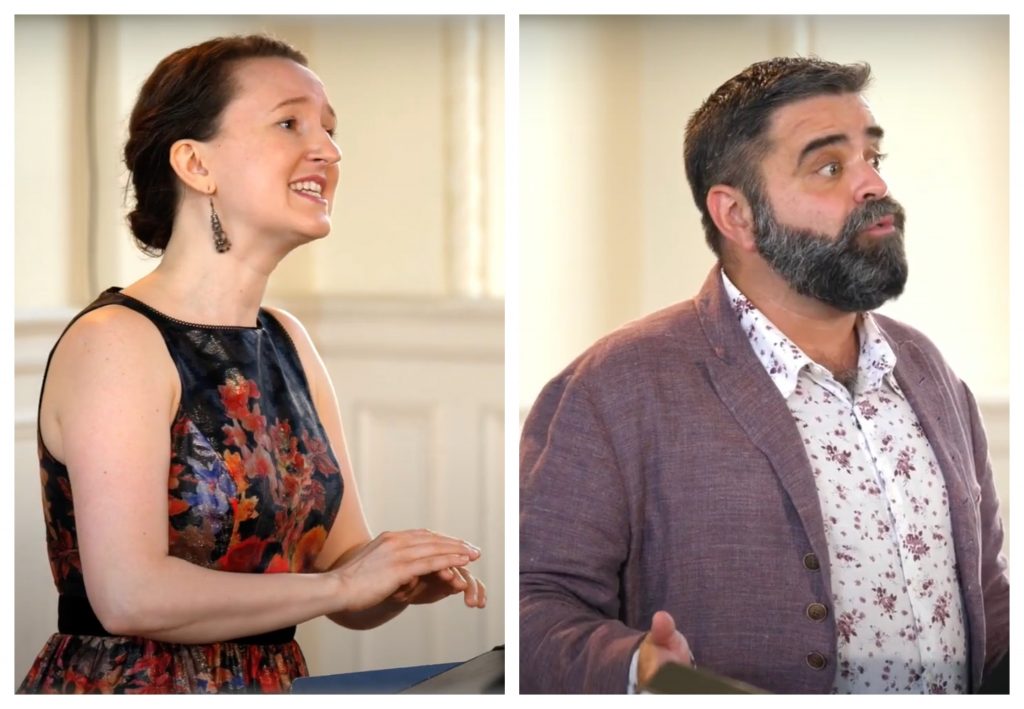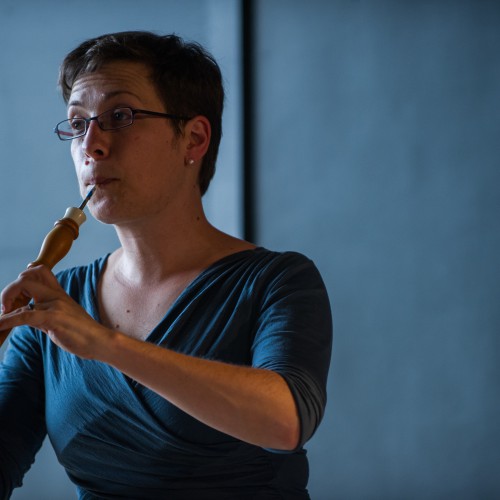by Jarrett Hoffman

“Games and Grounds” — which premieres online on February 18 at 7:30 pm and remains available on-demand until a Closing Reception on March 1 at that same hour — combines musical versions of Aesop’s Fables with virtuosic ground-bass variations by such composers as Rebel, Marais, and Rameau.
Tenor Jason McStoots and soprano Elena Mullins (above) will take turns telling the stories of an ant and a grasshopper, a lion and a rat, a tortoise and a hare, and a tortoise and an eagle. Those texts will be heard here set to simple airs and popular tunes from 1730s France, but in new English translations commissioned from Larry Rosenwald.
And Mullins will top off the program with her own new choreography for Rebel’s Caractères de la danse — one of a couple pieces that continue the thread of narrative, but in a more subtle way than the fables. See the full program here, and purchase tickets here.
I reached Les Délices director Debra Nagy by telephone to discuss all of that, beginning where else but with Aesop’s Fables. Those got us talking about childhood, specifically Nagy’s upbringing as a first-generation American.

Aesop’s Fables also fit right into that cultural realm. So while Nagy can’t quite relate to many cultural phenomena associated with childhood in America, she can relate to fables. “I even remember that one of the first things we did in high-school French class was memorize La cigale et la fourmi, which is The Ant and the Grasshopper,” she said.
But the main reason that fables ended up on this program is circumstance. They were originally intended to be included as divertissements in a theatrical project called The White Cat, initially scheduled to be premiered in April of 2020. Of course, COVID-19 intervened, as it would again with the rescheduled date in September. (Les Délices is now eyeing a premiere in the spring of 2022.)
After that second postponement, Nagy decided to arrange an audio recording session to read through the whole score for the first time, and to have for the archives. Another half-day session of video recording focused on the four fables we’ll hear on Thursday, as well as a few scenes and interviews.
The theme of “making lemonade out of lemons”— something Nagy said the ensemble has been doing all year — continued with the ground-bass variations, which she originally had in mind for a different program that would have also been called “Games and Grounds.” That one would have involved a play on words around the French la gamme, meaning a musical scale. “So I repurposed the idea of games as musical entertainments,” Nagy said. Plus, a few of Thursday’s selections come from a tour program called “Characters of the Dance” which Les Délices recorded last fall for distribution.
Bringing together excerpts from those different sessions involved getting into minutiae that can be both frustrating and kind of funny. One was the weather, meaning the lighting. “The main recording day for the grounds part of this program was three weeks later than the White Cat sessions,” Nagy said. “It was one of those days where storm clouds are moving in and out, so it could look like 7 pm when it’s actually 3 in the afternoon — and then it could be brilliantly sunny fifteen minutes later.”
Second was the matter of fashion: Nagy had to ask everyone to “please wear the same clothing” they had weeks earlier. Watch carefully, she said, laughing, and you’ll notice that violinist Julie Andrijeski’s hair changes between some recordings. “It’s not interesting, but this is the world we’re living in.”
Providing a few extra dimensions to the program are Rameau’s “Pantomime” (arranged by Nagy) from the opera Pigmalion, and Rebel’s Caractères de la danse. Both works carry on the theme of narrative, but unlike the fables, without using text. But as pieces that are “extensive and have their own arc, rather than being episodic,” they also add variation to the rhythm of the program and the experience for an audience. “They bring a different sort of emotional investment,” Nagy said. In contrast, the fables interspersed throughout are relatively short.
On that topic, someday Nagy hopes to build a program even more thoroughly around fables. “It would pair them with all sorts of animal-inspired music — a reflection of the natural world in music and storytelling.”
But back to the present-day, as the pandemic continues to restrict what an ensemble can do, it’s all about circumstance: in this case, creating “a light and pleasure-filled program from the high-quality material we had at hand.”
Published on ClevelandClassical.com February 16, 2021.
Click here for a printable copy of this article


